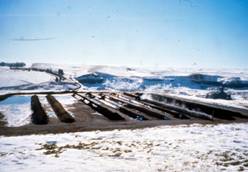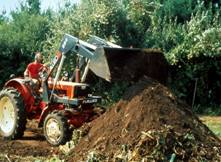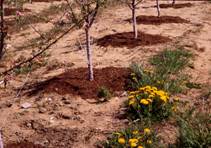Waste Management
IN SOUTH DAKOTA
Guide to Yard Waste Composting
History
In 1995 the state of South Dakota enacted a plan to reduce the amount of wastes disposed of in landfills. As a part of this plan, yard waste may no longer be taken to a landfill for disposal. Instead of burying yard waste in landfills, composting has become an important way to recycle yard waste.
Benefits of Composting
Composting yard waste reduces the amount of wastes disposed in landfills and produces a useful product.
- - Composting yard waste reduces disposal costs in landfills.
- - Finished compost can be used as a low cost landscaping material.
- - Incorporating compost into soil adds nutrients and organic matter and improves water retention of the soil.
How Compost Happens
With the help of many microorganisms, a little water and a little air, yard waste turns into good, useful compost.

Designing Your Compost Area
- - Design your compost area so that it is easy to manage.
- - Place your compost area in a location that will not offend neighbors.
- - Place yard waste in piles or windrows.
- - Construct berms around your compost area to control run-on and runoff.

Compost windrows.
Operating Your Compost Facility
- - Remove plastic from the compost piles or windrows.
- - Keep piles or windrows at sizes your equipment can manage.
- - Turn piles or windrows at least once a month to prevent foul odors and speed up the composting process.
- - Add water if the piles or windrows are very dry.
- - Allow the piles or windrows to heat up.
- - Keep finished compost separate from new compost piles or windrows.
- - Find an end use for finished compost.

Turning your compost.
Uses of Finished Compost
- - Landscaping - compost can be used as an alternative to more expensive topsoil.
- - Mulching - placing compost around the base of plants and trees helps them retain water and provides nutrients.
- - Erosion control - spreading compost over steep slopes promotes fast vegetation cover and is more resistant to water erosion than topsoil alone.
- - Remediation - compost can be used to cover closed solid waste disposal areas or other disturbed land.

Using finished compost.
For a printer friendly version of the yard waste composting information click here.
For additional yard waste composting information, contact the Solid Waste Section by email or by calling 773-3153.